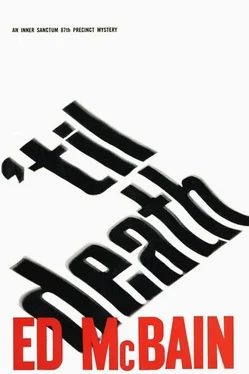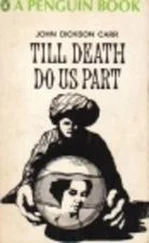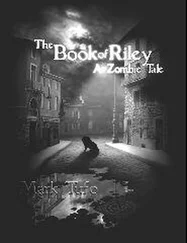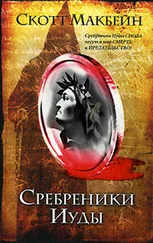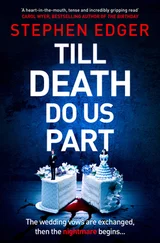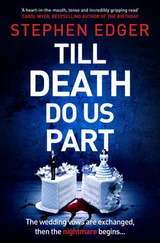She feinted with the shoe, and he brought up his left arm to ward off the blow, and then she moved swiftly to one side, and he saw only the blur of the red shoe coming at his face, felt only the crashing pain as the stiletto-like spike hit his temple. He felt his fingers loosen from the handle of the hammer. He felt himself pitching forward. He held out his arms to stop his fall, and the girl caught him as he came toward her and his head bounced against her shoulder, slid, and he felt the warm cushion of her breast for an instant before she viciously pushed him away from her.
He struck the floor and the last shamed thought he had was A girl. Jesus, a girl...
A boy or a girl, the baby was kicking up a storm.
Sitting with her father-in-law who had surely had too much to drink, Teddy Carella could not remember the heir apparent ever having raised such a fuss.
It was difficult for her to appreciate the oncoming dusk with her son- or daughter-to-be doing early-evening calisthenics. Every now and then the baby would kick her sharply, and she’d start from the sudden blow, certain that everyone at the reception was witnessing her wriggling fidgets. The baby seemed to have a thousand feet, God forbid! He kicked her high in the belly, close under her breasts, and then he kicked her again, lower in the pelvic region, and she was sure he’d turned a somersault, so widely diverse had the kicks been.
It’ll be over next week, she thought, and she sighed. No more backaches. No more children pointing fingers at me in the street. Hey, lady, what time does the balloon go up? Ha-ha, very funny. She glanced across the dance floor. The redhead from Teaneck or Gowanus or wherever had latched onto a new male, but it hadn’t helped Teddy very much. Steve hadn’t been anywhere near for the past few hours, and she wondered now what it was that could possibly be keeping him so occupied. Of course, it was his sister’s wedding, and she supposed he was duty bound to play the semihost. But why had Tommy called him so early this morning? And what where Bert and Cotton doing here? With the instincts of a cop’s wife, she knew that something was in the wind — but she didn’t know quite what.
The baby kicked her again.
Damn, she thought, I do wish you’d stop that.
Tony Carella had drunk a lot of whiskey and a lot of wine and a lot of champagne. He had not drunk so much since the time Steve got married and that was years ago.
In the glow of his stupor, he began to like the Weddings-Fetes, Incorporateds. They were really nice fellows. It was worth all the money he was giving them. Oh, madonna, how much money he was giving them! But it was worth it. Every penny. They were nice boys, all of them. Look at the nice dance floor they had made, bringing in that big flat platform and laying it right down in the center of his lawn, Santa Maria, my lawn! But they were nice boys. Look at the nice thing they had built for the fireworks at the end of the property. They would be nice, the fireworks. He loved the Weddings-Fetes, Incorporateds. He loved his wife. He loved his son and his daughter-in-law, and his daughter and his son-in-law. He loved everybody.
He loved Birnbaum.
Where was Birnbaum, anyway?
Why wasn’t Birnbaum sitting next to him on this day of his joy, drinking wine and champagne? If he knew Birnbaum, the old man was probably off in a corner someplace weeping.
My old friend, Tony thought, weeping.
I will find him. I will find him and give him a cigar.
He was starting out of his chair when he heard the scream from the edge of his property.
Carella had dispatched the boys from the 112th, the photographer, the assistant medical examiner, and the laboratory assistants, wondering all the while where Cotton Hawes had gone. He’d asked Cotton to stay with the body. Well, the body was now gone — and nearly everyone concerned with the body was also gone. And so was Cotton.
But where?
He had not been working with Hawes for too long a time, but he felt certain the man would not have pulled a stunt so childish as walking out on his date. Still, he’d been pretty angry back there a little while ago. And Christine, as cute as she was, had certainly been asking for trouble. She’d wanted Cotton to do a burn, and he had, but she’d stumbled onto a corpse in the bargain, which proves you shouldn’t play with fire, girls.
But would Cotton have walked out on her?
It was possible. Carella had to concede that it was definitely possible. There was no second-guessing the ways of maids and men. He’d handled many a suicide where a seemingly levelheaded young man had thrown himself out the nearest hotel window because a sweet young thing in a skirt had refused a date. Why, take his own Teddy. Annoyed because he’d been dancing with that wench from Flemington. God, that had been a long time ago, he could remember every detail of that night as if it were happening now. Faye, grrrr, she’d been a wonderful, wonderful—
Hey now.
Steady, lad.
He saw Teddy sitting near his father. He grinned and began walking toward her.
From the woods behind him, he heard someone scream, “Help! Help!”
He whirled and broke into a trot, crashing into the bushes. His service revolver was in his fist before he’d covered three feet.
The boys had been standing on the corner watching all the girls go by. They had been standing there all afternoon, they said. They had been standing right under that same lamppost near the el structure. Just standing. Just watching the girls. June was a good time for watching the girls, the boys said.
“Did you happen to notice the people who came down off the train?” Meyer asked.
“Yeah, we noticed the girls,” the boys said.
“Did you notice anybody else?”
“Yeah,” the boys said, “but mostly we noticed the girls.”
“Did you happen to see a man carrying a trombone case?”
“What does a trombone case look like?”
“You know,” O’Brien said. “A trombone case. Black leather. Long. With a sort of a flaring bell on one end.”
“Gee,” the boys said. “You’d better ask Charlie.”
“Which one of you is Charlie?”
“Charlie’s in the candy store. Hey, Charlie! Charlie, come on out here!”
“Is Charlie a musician?” Meyer asked.
“No, but his sister is taking piano lessons. She’s eight years old.”
“How old is Charlie?” Meyer asked skeptically.
“Oh, he’s a grown man,” the boys said. “He’s sixteen.”
Charlie came out of the candy store. He was a thin boy with a crew cut. He wore khaki trousers and a white tee shirt, and he ambled over to the boys under the lamppost with a curious expression on his face.
“Yeah!” he said.
“These guys have some questions.”
“Yeah!” He delivered the word as a cross between a question and an exclamation, as if surprised by his own query.
“Do you know what a trombone case looks like, Charlie?”
“Yeah!” he said, and again it was both a question and an exclamation.
“Did you see anyone come down those steps carrying one?”
“A trombone case?” This time it was purely a question.
“Yes,” Meyer said.
“Today?”
“Yes.”
“Down those steps?”
“Yes.”
“Yeah!” he said, the exclamation preceding the question.
“Which way did he go?”
“How do I know?” Charlie said.
“You saw him, didn’t you?”
“Yeah! Why? You need a trombone player? Does it have to be a trombone player? My kid sister plays piano.”
“Think, Charlie. Which way did he go?”
“Who remembers? You think I followed him or something?”
“He came down those steps?”
“Yeah!”
“Did he turn right or left?”
Читать дальше
